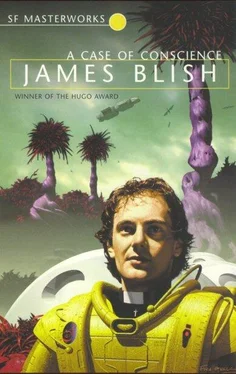“And on top of all of that—no, please, I’m not quite finished, Paul—on top of all that, the Lithians are decades ahead of us in some purely technical matters, just as we’re ahead of them in others. You should see what they can do with mixed disciplines—scholia like histochemistry, immunodynamics, biophysics, terataxonomy, osmotic genetics, electrolimnology, and half a hundred more. If you’d been looking, you would have seen.
“We have much more to do, it seems to me, than just to vote to open the planet That’s only a passive move. We have to realize that being able to use Lithia is only the beginning. The fact of the matter is that we actively need Lithia. We should say so in our recommendation.” Michelis unfolded himself from the window sill and stood up, looking down on all of them, but most especially at Ruiz-Sanchez. The priest smiled at him, but as much in anguish regardless of the way time had of turning any blade. The decision had already cost him many hours of concentrated, agonized doubt. But he believed that it had to be done.
“I disagree with all of you,” he said, “except Cleaver. I believe, as he does, that Lithia should be reported triple-E Unfavorable. But I think also that it should be given a special classification: X-One.”
Michelis’ eyes were glazed with shock. Even Cleaver seemed unable to credit what he had heard.
“X-One—but that’s a quarantine label,” Michelis said huskily.
“As a matter of fact—”
“Yes, Mike, that’s right,” Ruiz-Sanchez said. “I vote to seal Lithia off from all contact with the human race. Not only now, or for the next century—but forever.”
Forever.
The word did not produce the consternation that he had been dreading—or, perhaps, hoping for, somewhere in the back of his mind. Evidently they were all too tired for that. They took his announcement with a kind of stunned emptiness, as though it were so far out of the expected order of events as to be quite meaningless.
It was hard to say whether Cleaver or Michelis was the more overwhelmed. All that could be seen for certain was that Agronski recovered first, and was now ostentatiously reaming out his ears, as if in signal that he would be ready to listen again when Ruiz-Sanchez changed his mind.
“Well,” Cleaver began. And then again, shaking his head amazedly, like an old man: “Well…”
“Tell us why, Ramon,” Michelis said, clenching and unclenching his fists. His voice was quite flat, but Ruiz-Sanchez thought he could feel the pain under it.
“Of course. But I warn you, I’m going to be very roundabout What I have to say seems to me to be of the utmost importance. I don’t want to see it rejected out of hand as just the product of my peculiar training and prejudices—interesting perhaps as a study in aberration, but not germane to the problem. The evidence for my view of Lithia is overwhelming. It overwhelmed me quite against my natural hopes and inclinations. I want you to hear that evidence.” The preamble, with its dry scholiast’s tone and its buried suggestion, did its work well.
“He also wants us to understand,” Cleaver said, recovering a little of his natural impatience, “that his reasons are religious and won’t hold water if he states them right out.”
“Hush,” Michelis said intently. “Listen.”
“Thank you, Mike. All right, here we go. This planet is what I think is called in English ‘a set-up.’ Let me describe it for you briefly as I see it, or rather as I’ve come to see it.
“Lithia is a paradise. It has resemblances to a number of other planets, but the closest correspondence is to the Earth in its pre-Adamic period, before the coming of the first glaciers. The resemblance ends there, because on Lithia the glaciers never came, and life continued to be spent in the paradise, as it was not allowed to do on Earth.”
“Myths,” Cleaver said sourly.
“I use the terms with which I’m most familiar; strip off those terms and what I am saying is still a fact that all of you know to be true. We find here a completely mixed forest, with plants that fall from one end of the creative spectrum to the other living side by side in perfect amity, cycad with cycladella, giant horsetail with flowering; trees. To a great extent that’s also true of the animals. The lion doesn’t lie down with the lamb here because Lithia has neither animal, but as an allegory the phrase is apt. Parasitism occurs rather less often on Lithia than it does on Earth, and there are very few carnivores of any sort except in the sea. Almost all of the surviving land animals eat plants only, and by a neat arrangement which is typically Lithian, the plants are admirably set up to attack animals rather than each other.
“It’s an unusual ecology, and one of the strangest things about it is its rationality, its extreme, almost single-minded insistence upon one-for-one relationships. In one respect it looks almost as though somebody had arranged the whole planet as a ballet about Mengenlehre—the theory of aggregates.
“Now, in this paradise we have a dominant creature, the Lithian, the man of Lithia. This creature is rational. It conforms, as if naturally and without constraint or guidance, to the highest ethical code we have evolved on Earth. It needs no laws to enforce this code. Somehow, everyone obeys it as a matter of course, although it has never even been written down. There are no criminals, no deviates, no aberrations of any kind. The people are not standardized—our own very bad and partial answer to the ethical dilemma—but instead are highly individual. They choose their own life courses without constraint—yet somehow no antisocial act of any kind is ever committed. There isn’t even any word for such an act in the Lithian language.”
The recorder made a soft, piercing pip of sound, announcing that it was threading a new tape. The enforced pause would last about eight seconds, and on a sudden inspiration, Ruiz-Sanchez put it to use. On the next pip, he said:
“Mike, let me stop here and ask you a question. What does this suggest to you, thus far?”
“Why, just what I’ve said before that it suggested,” Michelis said slowly. “An enormously superior social science, evidently founded in a precise system of psychogenetics. I should think that would be more than enough.”
“Very well, I’ll go on. I felt as you did, at first. Then I came to ask myself some correlative questions. For instance: How does it happen that the Lithians not only have no deviates—think of that, no deviates!—but that the code by which they live so perfectly is, point for point, the code we strive to obey? If that just happened, it was by the uttermost of all coincidences. Consider, please, the imponderables involved. Even on Earth we have never known a society which evolved independently exactly the same precepts as the Christian precepts—by which I mean to include the Mosaic. Oh, there were some duplications of doctrine, enough to encourage the twentieth century’s partiality toward synthetic religions like theosophism and Hollywood Vedanta, but no ethical system on Earth that grew up independently of Christianity agreed with it point for point. Not Mithraism, not Islam, not the Essenes—not even these, which influenced or were influenced by Christianity, were in good agreement with it in the matter of ethics.
“And yet here on Lithia, fifty light-years away from Earth and among a race as unlike man as man is unlike the kangaroos, what do we find? A Christian people, lacking nothing but the specific proper names and the symbolic appurtenances of Christianity. I don’t know how you three react to this, but I found it extraordinary and indeed completely impossible—mathematically impossible—under any assumption but one. I’ll get to that assumption in a moment.”
Читать дальше











